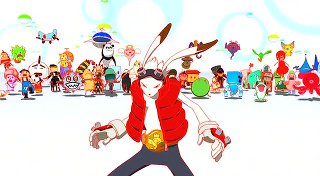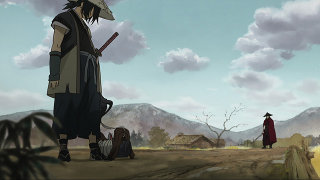I have been woefully neglectful of anime over the past year and a half or so, but I’ve still occasionally taken in a movie here or there, and after this year’s very nice The Secret World of Arrietty, I threw a few Anime movies I’ve been meaning to catch up with in my Netflix Queue. Here are some assorted thoughts on each:
- Summer Wars – From the team that brought us The Girl Who Leapt Through Time, I had high hopes for this one, and for the most part, it hits the mark (the Otakusphere also seems pretty enamored with it). It certainly inherits the former film’s knack for good pacing, and it displays a good balance between simple, heartfelt drama and more fantastical framing elements. In this case, the drama is derived from our math nerd hero Kenji and his schoolboy crush on Natsuki. When Natsuki makes a cryptic request for help during summer vacation, Kenji jumps at the opportunity. It seems Natsuki is from an influential, if not particularly wealthy family, and they’re all gathering together to celebrate the matriarch’s 90th birthday. Natsuki wants Kenji to pretend to be her fiance in order to please her grandmother. This side of the story makes for a sorta comedy of errors, with a stack of misfortune continually piling up on Kenji, until he starts to fight back.
The more fantastical element of the story is a ridiculously connected social network called Oz. It is very reminiscent of Stephenson’s Metaverse from Snow Crash, though I guess you could say that Oz is what Second Life wishes it could be… and it’s also an object lesson on why such a centralized system is improbable and foolish. As portrayed in the movie, Oz has over billion users, and the system provides an infrastructure for all aspects of life, from commerce and banking to socializing and gaming to government services. It’s a comprehensive network, and it can be accessed from just about anywhere (i.e. computers, phones, televisions, other appliances, etc…). And it’s centralized, so when something goes wrong, things get reallly hairy out here in meatspace.
The crux of the story arises when Kenji, who spends his free time as an admin in Oz, gets a mysterious message consisting entirely of a sequence of numbers. Being a math nerd who is clearly in over his head when pretending to be Natsuki’s fiance, he relishes the opportunity to solve a more orderly problem, which he does. But then, something bad starts to happen. It seems that the problem he solved has allowed someone to start hacking Oz accounts… using Kenji’s avatar (I won’t discuss exactly who this is, but I will say that it fits with the Japanese relationship with technology… and in this case, of course, it’s all the fault of Americans). This does not improve his reputation with Natsuki’s family.
I won’t get into more details after that, but it’s a really fun story. If, that is, you can get past the absurdity of Oz’s overly-connected monopoly on life. I have to admit that the premise of Oz bothered me at first, but once I got past that, things proceeded well from there. We’re treated to a very nice family dynamic, including the wonderful grandmother character, who utilizes her own low-tech social network to bring her family (and perhaps the country) together during a crisis. The romance at the heart of the story is well done, as is the conflict in Oz. Visually, it’s a gorgeous and inventive movie, and that certainly helps with the pacing. Overall, it totally won me over, despite some misgivings at the heart of the premise. ***
- Sword of the Stranger – This is a movie that I don’t really remember adding to my queue (nor where I saw the recommendation, as it’s not typical Otakusphere material, and thus I can’t find any real references to it there), but I’m glad I did, as it ended up being a very entertaining, if a bit harrowing, experience. The story is rather simplistic: a young Japanese boy named Kotaro is being hunted by a group of Chinese swordsmen for mysterious reasons. While fleeing, Kotaro and his dog run across a nameless Ronin, and a… fatherly? brotherly? relationship develops between them. The Ronin is quite talented, but is haunted by a life of violence, and does not want to fight. As the villains close in on our heroes, he has to make a choice: flee or fight?
So it’s a premise that isn’t expanding any horizons, but the visual style of the film and the way the action sequences are constructed certainly make up for any shortcomings on the story front. That being said, I did find the villains interesting, as well as the nationalities of various characters. There are Chinese in the film, and I believe they’re speaking in both Mandarin and Japanese at times (not really that familiar with either language, but that’s the impression I got), and then there’s the “Western” swordsman who travels with the villains. He’s a force of nature, taking on all comers, but often bored by their paltry resistance. His goal seems less focused on hunting down the child than on finding a worthy opponent (which he does, in the form of the aforementioned Ronin). Again, not sure what the significance of all these nationalities means, but I feel like there’s probably something there. It is quite a graphically violent movie, bloody and grim at times, especially towards the end of the film, but the movie does an excellent job establishing stakes and putting our heroes through their paces. ***
- Paprika – Another movie that doesn’t seem to appear much in the Otakusphere, and again, I don’t remember where I found the recommendation. I have mixed feelings about the movie, and I have to admit that I may not have given it an entirely fair shake. I watched it in two sittings, with the first one being late at night when I probably wasn’t in any condition to give the film the level of attention it warrants. It’s basically about how a new psychological device allows people to enter into one another’s dreams, and then how that technology starts to break down. Paprika is one of the characters avatars, a redheaded superhero in the world of dreams, but a straightlaced psychologist out here in the real world. The film is visually spectacular, but the blurry line between dreams and reality gets to be a bit bewildering. You can almost never tell where you are or what’s really going on. Again, I feel like this is a movie that demands multiple viewings (or at least, a more attentive viewing than I gave it) in order to break down what’s really happening. My initial reaction was one of interest that was ultimately not very well fulfilled. I enjoyed my time with the movie and was never bored, but I wasn’t particularly blown away by the story, which seemed fragmented and unclear.
The film was apparently a big influence on Christopher Nolan’s Inception, and there may be some common DNA between the two films, but Paprika’s dreams are decidedly more dreamlike (i.e. uncanny and shifting and strange). There are some visual motifs that probably demand some sort of symbolic analysis, but again, I wasn’t really up to that task upon first viewing. Again, we’ve got a story that explores Japan’s uncomfortable relationship with technology, a theme that seems to run across a lot of postwar Japanese films and television (for obvious reasons, though this movie doesn’t resort to direct mushroom cloud symbolism or anything). Ultimately, I’m not entirely sure the film worked for me, but even if it didn’t, I’m still impressed by the ambition here. Call it an interesting failure at worst, and it may be even better than I’m making it out to be. It’s certainly a movie I’d like to check out again sometime… At the very least, they tried to do a lot of interesting things!
And that about covers it for now. I have a few series in my Netflix queue, but I’m not sure if or when I’ll get to them. The only one I see in my Watch Instantly queue is Samurai 7, which has been on the list for a while and appeals to my love of the original Seven Samurai (and the many riffs on the same story).



